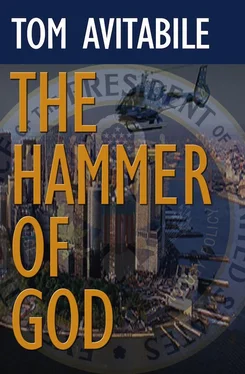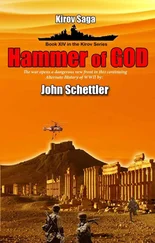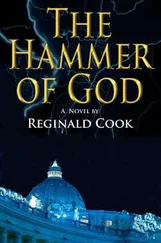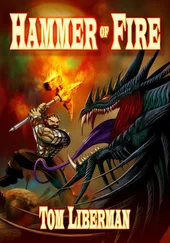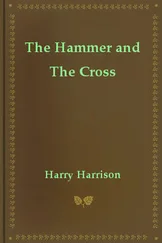Tom Avitabile - The Hammer of God
Здесь есть возможность читать онлайн «Tom Avitabile - The Hammer of God» весь текст электронной книги совершенно бесплатно (целиком полную версию без сокращений). В некоторых случаях можно слушать аудио, скачать через торрент в формате fb2 и присутствует краткое содержание. Жанр: Триллер, на английском языке. Описание произведения, (предисловие) а так же отзывы посетителей доступны на портале библиотеки ЛибКат.
- Название:The Hammer of God
- Автор:
- Жанр:
- Год:неизвестен
- ISBN:нет данных
- Рейтинг книги:3 / 5. Голосов: 1
-
Избранное:Добавить в избранное
- Отзывы:
-
Ваша оценка:
- 60
- 1
- 2
- 3
- 4
- 5
The Hammer of God: краткое содержание, описание и аннотация
Предлагаем к чтению аннотацию, описание, краткое содержание или предисловие (зависит от того, что написал сам автор книги «The Hammer of God»). Если вы не нашли необходимую информацию о книге — напишите в комментариях, мы постараемся отыскать её.
The Hammer of God — читать онлайн бесплатно полную книгу (весь текст) целиком
Ниже представлен текст книги, разбитый по страницам. Система сохранения места последней прочитанной страницы, позволяет с удобством читать онлайн бесплатно книгу «The Hammer of God», без необходимости каждый раз заново искать на чём Вы остановились. Поставьте закладку, и сможете в любой момент перейти на страницу, на которой закончили чтение.
Интервал:
Закладка:
The rest of their journey was blessedly uneventful until they reached the watering station. They had arrived three hours ahead of the meeting time. Kasiko’s uncle had seven workers ready to disembark the train so that the six men and Kasiko could assume their places and sleeping bunks for the two-day train ride through northern Europe. Unexpectedly, Soviet troops had descended on the railroad siding. The reason became apparent as the men watched the tracks from a berm two kilometers off. A Russian armament train with troops, tanks, trucks, and even folded-wing airplanes stopped to fill its water tanks at the tower.
“We wait for the freight train,” was all Kasiko said to his charges.
Four hours later, the anemic whistle of the northbound freight echoed through the valley. Kasiko led his men to within fifty meters of the track. To his eyes and nose, there were no Soviets near. The old train rumbled into the yard area. His uncle was hanging off the end carriage of the train waving a lantern, signaling the engineer. Kasiko approached him cautiously.
“Uncle, are we still going to Antwerp?”
“Yes, my nephew. The train is a little behind schedule, but we are. Do you have your packages?”
Kasiko whistled and waved his scientists onboard. As they entered the crew van at the rear of the train his uncle said, “Kas, you said six. I count seven. I only have cover for seven including you.”
“I know. There was a change of plans. I’ll stay behind.”
“You can’t. Those soldiers you shot are all the news. They are looking for you, my nephew. They have searched this train twice. That’s why we are delayed.”
“I’ll take my chances.”
“No, I will,” Dr. Brodenchy said. “I am the one who forced you to bring my brother. I am responsible and I will stay.”
Kasiko took in the scientist. “Your brother, is he a scientist?”
“Yes. He just graduated as a physicist. He was visiting…”
“I know; he was home from school…he is as good as all of you. It is I who am expendable here.”
Brodenchy was intrigued. The last thing he expected from this coarse and gruff freedom fighter was chivalry.
“Now, now, nephew,” Kasiko’s uncle said, “no one has to be sacrificed. I’ve got an idea.”
?§?
The train started with a slam, then jolted and started chugging down the track with some very odd, soft-handed, white-skinned, and manicured crewmen. Meanwhile, some very well dressed railroad workers waited in newfound overcoats and suits for the railroad employees’ bus to take them back across country to their freight yard. Kasiko tried out his hidden place in an upper berth in this old sleeper car that was now the crew’s rolling home.
Two days later, and without incident, the train arrived in Switzerland.
CHAPTER TWO
Six years later, in 1962, young Peter Remo came home from P.S. 21 with a note from his second grade teacher:
Your son
Peter
is expected to have a project for the science fair this Monday.
When Tony got home, Anna showed the boy’s father the note. The next night Tony came home with a grape box and a bag. After dinner, young Peter watched as his father went to the closet and got the hammer. Using his foot and the claw of the hammer, he pried the box apart. The sides of the box were 5/8” clear pine and had a label across the face. He took one of these sturdy ends and flipped it label-down. He put the wood on his knee and looked at his son. “Ever hear about the cobbler who worked on his knee?”
Peter watched as his dad nailed little things onto the board in his lap, and then fitted a battery and a small light bulb to it. When he finished, he said, “C’mere.” Tony opened his arm above his knee, which Peter knew meant, “Hop on.”
The board was on the table as Tony told his son what it was. “This is the battree, this is the light bulb, this is the switch. When you trowe the switch, the juice goes from the battree, through the switch to light the bulb. Here, it’s your science project, take it to school tomorrow.”
With that, Peter walked away marveling at the invention in his hands. He spent all night in his darkened room closing and opening the knife switch and lighting the bulb. Eventually he found his way under his covers and now had an illuminated tent. The simple working circuit was mesmerizing to the little boy. So much, in fact, that it completely rewired his brain.
CHAPTER THREE
Many Hungarian immigrants settled in Jackson Heights in Queens. So it was no surprise that one day, when a big box from Budapest arrived at Kasiko’s apartment, the kids and neighbors all crowded into his place. It had been a year since he had arrived in the United States after traipsing around Europe. He was thankful that he was able to get his mother out of Hungary and she was now with him in the apartment. He opened the crate and couldn’t believe his eyes. Coffees, cakes, condiments, clothes, jewelry, and one very special box. “The gifts of a grateful nation,” the card read. Kasiko was a true Hungarian hero. Even if Hungary was behind the Iron Curtain, his countrymen made him know he was in their hearts. When the crowd left the apartment, Kasiko opened the special box. In it was a scribed egg on a beautiful gold-spun stand. It was of the deepest blue color and the etching on it was like a fine lace masterwork. He proudly placed it on the mantle.
In 1968, the United States was in the midst of volcanic upheaval. Anti-establishment lava flowed from college campuses down the main streets of cities big and small, igniting passions and inflaming politics. To be young then was to be in a perpetual state of rebellion. In a previous generation’s movie, the sheriff of a town invaded by young Marlon Brando’s motorcycle gang asked the brooding teen what his group was rebelling against. Brando’s answer, though uttered in an earlier decade, summed up the social/political movement of the ’60s: “I dunno, what do you got?” In the latter part of that decade, that sentiment was now, literally, on drugs. Whatever could be revolted against was. Whatever could be protested became a cause celebre . Sex, drugs, and rock ‘n roll made it all sweeter. Revolution hung in the air like marijuana smoke.
All of the ’60s dissonance, clamor, awakenings, and infamous moments were mere background noise to Peter. He was so focused on his current project that his friends on the block hardy ever saw him. No stickball, no ringolevio, no hot beans, no king queen, no box ball, none of the street games. Not even two-hand-touch football. The reason for Peter’s self-imposed exile went back to the great blackout of ‘67 when he quickly concocted several of the devices his father made for him for the second grade science fair and placed them at the landings of the stairs in the pitch-dark tenement. Those little lights stopped many tenants from taking a tumble down the marble steps while the electricity was out. So grateful were the neighbors that they started giving him wires, phones, radios, even televisions to tinker with. This sudden windfall of electronic parts started Peter on his greatest project ever. At fourteen, he was going to build a computer.
The estimated amount of money the computer would cost was a small fortune for a boy his age: almost $35. There was no way that kind of money was going to come from an allowance of fifty cents a week. Undeterred by the financial challenge, he started to improvise. He read up on all manner of early computer science and found out about the new transistor that was rapidly replacing tubes in electronics. He started to make his own basic building blocks of computers from old salvaged parts and a discarded knock hockey set he found in the lot. The Masonite playing surface became the material he drilled to make circuit boards. He copied wiring diagrams from a 1960 article by Ronald Benray in Electronics Illustrated on making a digital computer. It showed the basic schematic for the “E-J Flip Flop.”
Читать дальшеИнтервал:
Закладка:
Похожие книги на «The Hammer of God»
Представляем Вашему вниманию похожие книги на «The Hammer of God» списком для выбора. Мы отобрали схожую по названию и смыслу литературу в надежде предоставить читателям больше вариантов отыскать новые, интересные, ещё непрочитанные произведения.
Обсуждение, отзывы о книге «The Hammer of God» и просто собственные мнения читателей. Оставьте ваши комментарии, напишите, что Вы думаете о произведении, его смысле или главных героях. Укажите что конкретно понравилось, а что нет, и почему Вы так считаете.
